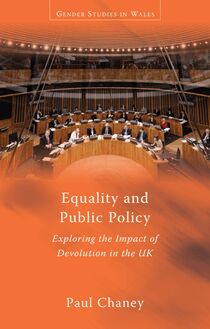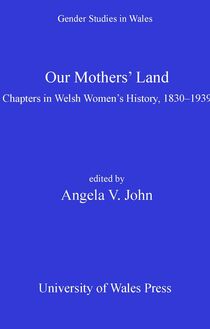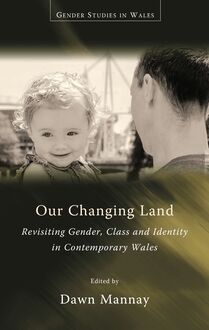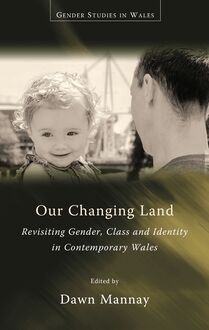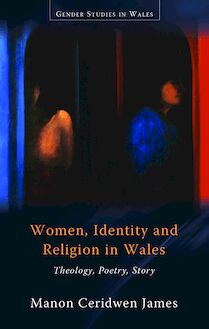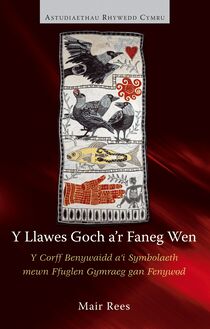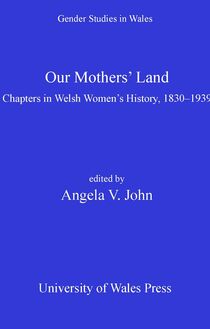-
 Univers
Univers
-
 Ebooks
Ebooks
-
 Livres audio
Livres audio
-
 Presse
Presse
-
 Podcasts
Podcasts
-
 BD
BD
-
 Documents
Documents
-
- Cours
- Révisions
- Ressources pédagogiques
- Sciences de l’éducation
- Manuels scolaires
- Langues
- Travaux de classe
- Annales de BEP
- Etudes supérieures
- Maternelle et primaire
- Fiches de lecture
- Orientation scolaire
- Méthodologie
- Corrigés de devoir
- Annales d’examens et concours
- Annales du bac
- Annales du brevet
- Rapports de stage
La lecture à portée de main
276 pages
English
Découvre YouScribe en t'inscrivant gratuitement
Je m'inscrisDécouvre YouScribe en t'inscrivant gratuitement
Je m'inscris
Obtenez un accès à la bibliothèque pour le consulter en ligne
En savoir plus
En savoir plus
276 pages
English
Obtenez un accès à la bibliothèque pour le consulter en ligne
En savoir plus
En savoir plus

Description
The first volume in the new series Gender Studies in Wales, this book argues that the way in which people came to perceive and to represent themselves as Welsh was profoundly affected by the gender ideologies prevalent during the Romantic and Victorian periods. "Nineteenth-Century Women's Writing in Wales: Nation, Gender and Identity" introduces readers to a hundred Welsh women authors at work during the years 1780-1900, some writing in Welsh and some in English. In so doing, it rescues many of these authors from critical neglect and oblivion. In the second half of the nineteenth century in particular, Welsh women writers in both languages were numerous and enjoyed a degree of influence on Welsh culture easily commensurate with that of women writers today. By covering the nineteenth century chronologically, this book traces the coming into being of the Welsh nation as its women in particular saw it, and as they helped to create it.
Sujets
Informations
| Publié par | University of Wales Press |
| Date de parution | 15 février 2010 |
| Nombre de lectures | 0 |
| EAN13 | 9780708322871 |
| Langue | English |
| Poids de l'ouvrage | 1 Mo |
Informations légales : prix de location à la page 0,0450€. Cette information est donnée uniquement à titre indicatif conformément à la législation en vigueur.
Extrait
Gender Studies in Wales
For Women, For Wales and For Liberalism
Women in Liberal Politics in Wales 1880 - 1914
Ursula Masson
University of Wales Press
NINETEENTH-CENTURY WOMEN’S WRITING IN WALES
Gender Studies in Wales Astudiaethau Rhywedd yng Nghymru
Series Editors Jane Aaron, University of Glamorgan Brec’hed Piette, Bangor University Sian Rhiannon Williams, University of Wales Institute Cardiff
Series Advisory Board Deirdre Beddoe, Emeritus Professor Mihangel Morgan, Aberystwyth University Teresa Rees, Cardiff University
The aim of this series is to fill a current gap in knowledge. As a number of historians, sociologists and literary critics have for some time been pointing out, there is a dearth of published research on the character-istics and effects of gender difference in Wales, both as it affected lives in the past and as it continues to shape present-day experience. Socially constructed concepts of masculine and feminine difference influence every aspect of individuals’ lives; experiences in employment, in edu-cation, in culture and politics, as well as in personal relationships, are all shaped by them. Ethnic identities are also gendered; a country’s history affects its concepts of gender difference so that what is seen as appro-priately ‘masculine’ or ‘feminine’ varies within different cultures. What is needed in the Welsh context is more detailed research on the ways in which gender difference has operated and continues to operate within Welsh societies. Accordingly, this interdisciplinary and bilingual series of volumes on Gender Studies in Wales, authored by academics who are leaders in their particular fields of study, is designed to explore the diverse aspects of male and female identities in Wales, past and present. The series is bilingual, in the sense that some of its intended volumes will be in Welsh and some in English.
NINETEENTH-CENTURY WOMEN’S WRITING IN WALES
NATION, GENDER AND IDENTITY
Jane Aaron
CARDIFF UNIVERSITY OF WALES PRESS 2010
© Jane Aaron, 2007
First edition published in 2007 Second edition published in 2010
All rights reserved. No part of this book may be reproduced in any material form (including photocopying or storing it in any medium by electronic means and whether or not transiently or incidentally to some other use of this publication) without the written permission of the copyright owner except in accordance with the provisions of the Copyright, Designs and Patents Act 1988 or under the terms of a licence issued by the Copyright Licensing Agency Ltd, Saffron House, 6–10 Kirby Street, London, EC1N 8TS. Applications for the copyright owner’s written permission to reproduce any part of this publication should be addressed to The University of Wales Press, 10 Columbus Walk, Brigantine Place, Cardiff, CF10 4UP.
www.uwp.co.uk
British Library Cataloguing-in-Publication Data A catalogue record for this book is available from the British Library.
ISBN 978-0-7083-2277-2 e-ISBN 978-0-7083-2287-1
The right of Jane Aaron to be identified as author of this work has been asserted by her in accordance with sections 77, 78 and 79 of the Copyright, Designs and Patents Act 1988.
Printed in Wales by Dinefwr Press, Llandybïe
i JTK
Acknowledgements
I am indebted to a number of individuals and institutions for their help with this book. The two main debts I have incurred are to John Koch and Diana Wallace, who read through the whole manuscript with meticulous care and made a great many useful suggestions for amend-ments; I am very grateful to them both. I should also like to thank the many friends and colleagues who discussed aspects of the book with me and spurred me on, in particular Deirdre Beddoe, Catherine Brennan, Catherine Charnell-White, Claire Flay, Katie Gramich, E. Wyn James, Ursula Masson, Sarah Prescott, Rosanne Reeves, and my two Gender Studies in Wales co-editors, Brec’hed Piette and Sian Rhiannon Williams. As for institutions, the volume could not have been completed without the aid of an Arts and Humanities Research Council grant which bought a respite from teaching duties, and I should also like to thank the University of Glamorgan for providing sabbatical relief. And without the help of the staff of the National Library of Wales, in particular Huw Walters, it would not have been what it is; the opportunity they afforded me of browsing in the library’s stacks led to the inclusion within these pages of many authors whom I would not otherwise have discovered. My debt is great also to the staff of the University of Wales Press, particularly Sarah Lewis, for their enthusiastic support not only of this book but also of the series of which it forms a part. The book owes its origins to my earlier Welsh-language volume on the image of the Welsh woman in nineteenth-century women’s writing,Pur fel y Dur: Y Gymraes yn Llên Menywod y Bedwaredd Ganrif ar Bymtheg, but it is not a translation of it. This present study covers the century with greater thoroughness, and includes twice the number of authors discussed in the previous work. In the struggle to encompass all the material, and because of the difficulties of introducing to an English-language audience texts not available in translation, I have in some
Acknowledgements
cases limited the discussion of the Welsh-language writers included here: readers interested in the hymn writers, for example, will find more extensive analyses of their work inPur fel y Dur. Though they have since been much revised, parts of this book have also appeared in the following publications:Women’s Writing, 1 (1994); Re-visioning Romanticism: British Women Writers, 1776–1837, edited by Carol Shiner Wilson and Joel Hafner (Philadelphia: University of Pennsylvania Press, 1994);Welsh Writing in English: A Yearbook of Critical Essays, 1 (1995);Feminisms on Edge: Politics, Discourses and National Identitiesedited by Karen Atkinson, Sarah Oerton and Gill Plain (Cardiff: Cardiff Academic Press, 2000); andA Tolerant Nation? Exploring Ethnic Diversity in Wales, edited by Charlotte Williams, Neil Evans and Paul O’Leary (Cardiff: University of Wales Press, 2003). All of this material is used here by permission of the publishers.
viii
-
 Univers
Univers
-
 Ebooks
Ebooks
-
 Livres audio
Livres audio
-
 Presse
Presse
-
 Podcasts
Podcasts
-
 BD
BD
-
 Documents
Documents
-
Jeunesse
-
Littérature
-
Ressources professionnelles
-
Santé et bien-être
-
Savoirs
-
Education
-
Loisirs et hobbies
-
Art, musique et cinéma
-
Actualité et débat de société
-
Jeunesse
-
Littérature
-
Ressources professionnelles
-
Santé et bien-être
-
Savoirs
-
Education
-
Loisirs et hobbies
-
Art, musique et cinéma
-
Actualité et débat de société
-
Actualités
-
Lifestyle
-
Presse jeunesse
-
Presse professionnelle
-
Pratique
-
Presse sportive
-
Presse internationale
-
Culture & Médias
-
Action et Aventures
-
Science-fiction et Fantasy
-
Société
-
Jeunesse
-
Littérature
-
Ressources professionnelles
-
Santé et bien-être
-
Savoirs
-
Education
-
Loisirs et hobbies
-
Art, musique et cinéma
-
Actualité et débat de société
- Cours
- Révisions
- Ressources pédagogiques
- Sciences de l’éducation
- Manuels scolaires
- Langues
- Travaux de classe
- Annales de BEP
- Etudes supérieures
- Maternelle et primaire
- Fiches de lecture
- Orientation scolaire
- Méthodologie
- Corrigés de devoir
- Annales d’examens et concours
- Annales du bac
- Annales du brevet
- Rapports de stage
Signaler un problème
YouScribe
Le catalogue
Le service
© 2010-2024 YouScribe
